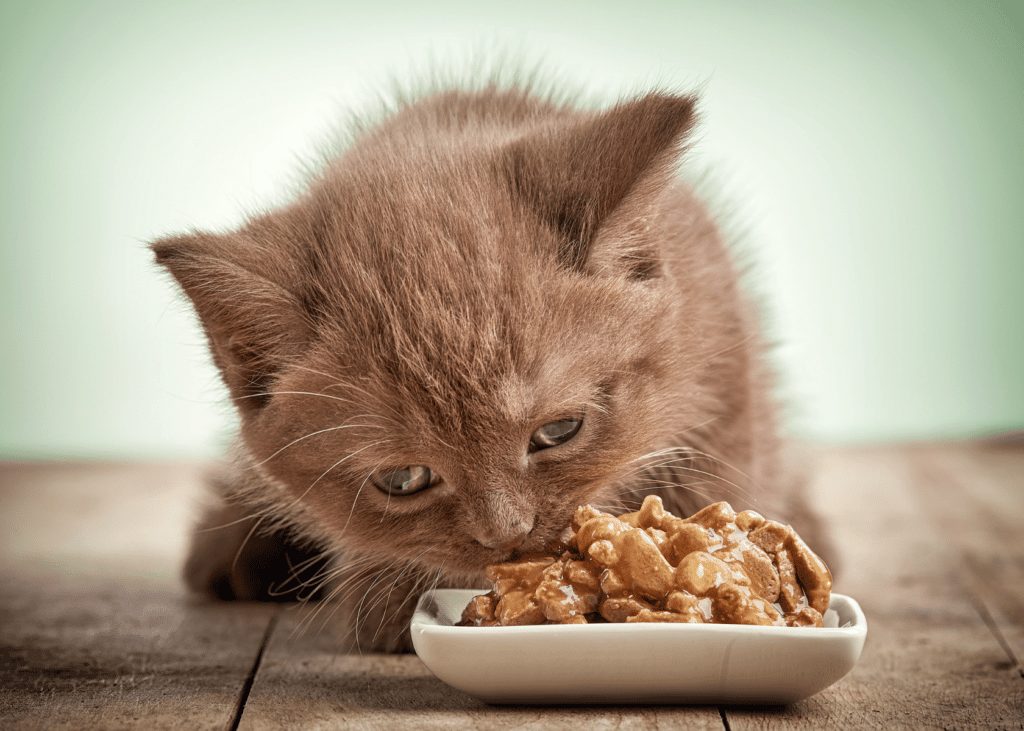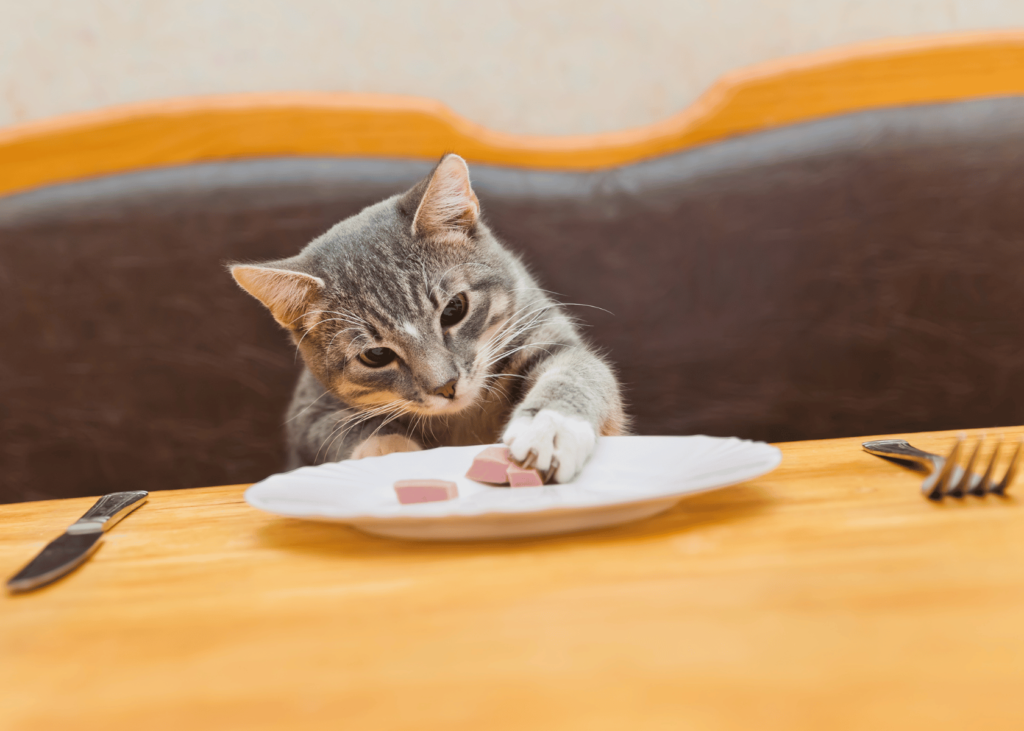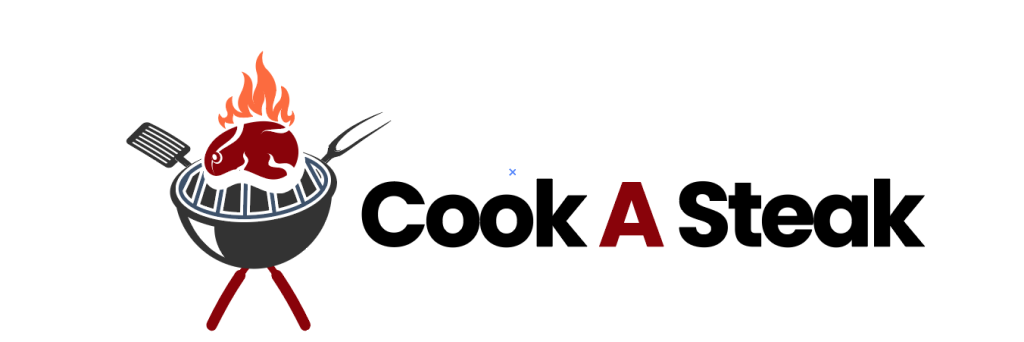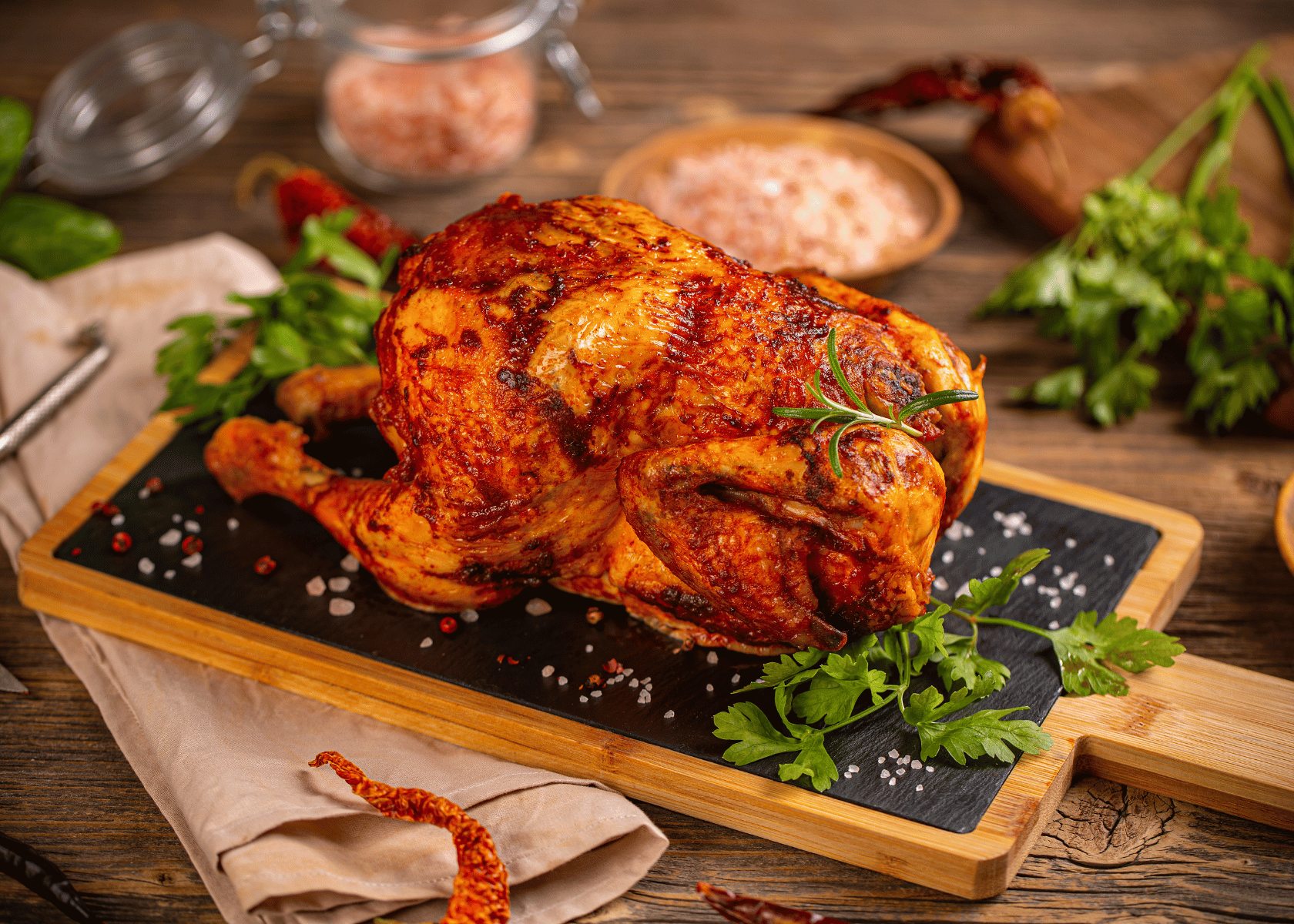Ever wondered, can cats have rotisserie chicken? If so, you’re not alone. I’ve faced this feline conundrum before and decided to delve into the research behind it. It turns out, while chicken is generally safe for our furry friends, rotisserie style could pose some problems due to higher sodium content and potentially toxic spices.
Stick around as we unravel whether your cat should be sharing your dinner or sticking to their kibble – trust me, it’s more than just curiosity!
Key Takeaways
- Feeding rotisserie chicken to cats can pose several risks to their health, including food poisoning, exposure to toxic and harmful ingredients, high fat and grease content, high salt and calorie content, and a lack of balanced nutrition.
- Cats require a balanced diet with specific levels of vitamins, minerals, and other essential nutrients for optimal health. Rotisserie chicken may lack these essential nutrients.
- It is best to avoid feeding cats rotisserie chicken altogether and opt for alternative sources of protein that provide complete nutrition without the added risks.
- Alternative options include fish (such as salmon or tuna), turkey (skinless and boneless), boiled meat (lean cuts like chicken breast or turkey), cheese (in moderation), and cooked eggs (fully cooked without any added spices or seasonings).
Risks of Feeding Rotisserie Chicken to Cats
Can cats have rotisserie chicken? It’s not advisable! Feeding cats rotisserie chicken can pose several risks to their health.
Food poisoning
Food poisoning is a significant risk when feeding cats rotisserie chicken. This ready-to-eat delicacy is often left unrefrigerated for hours, encouraging the growth of harmful bacteria such as Salmonella or Campylobacter.
Exposure to these pathogens can lead to severe gastrointestinal problems in cats, characterized by symptoms like vomiting, diarrhea, and loss of appetite. Beyond these immediate risks, recurrent food poisoning can also contribute to long-term health issues such as kidney disease.
As pets have smaller bodies and different metabolism compared to humans, they are more susceptible to toxic elements in foods left at room temperature for prolonged periods. So next time you think about sharing your rotisserie chicken with your feline friend – consider this risk first! It may save them a lot of discomfort and you a trip to the vet’s office.
Toxic and harmful ingredients
Feeding rotisserie chicken to cats can pose risks due to the presence of toxic and harmful ingredients. Rotisserie chicken often contains spices and seasonings that can be dangerous for cats.
Some spices commonly used, such as onion powder or garlic, contain compounds that are toxic to felines. These ingredients can lead to anemia and damage red blood cells in cats.
In addition to potentially toxic spices, rotisserie chicken may also contain high levels of sodium. Cats have different dietary needs than humans, and excessive sodium intake can lead to health issues such as high blood pressure and kidney problems in our furry friends.
It’s important to remember that even small amounts of these ingredients can cause harm over time.
High fat and grease content
Rotisserie chicken may be tempting to share with your feline friend, but it’s important to consider the high fat and grease content that can be harmful to their health. Cats have unique dietary needs, and a diet high in fat can lead to weight gain and obesity, which increase the risk of other health issues such as diabetes and joint problems.
Additionally, excessive grease consumption can cause digestive issues like diarrhea or vomiting in cats. It’s best to stick to a balanced diet specifically formulated for cats that meet all their nutritional requirements without the added risks of rotisserie chicken’s high fat and grease content.
High salt content

Feeding rotisserie chicken to cats can be risky due to its high salt content. Cats have a low tolerance for sodium, and excessive intake can lead to dehydration and kidney problems. So, we know that it’s a no to can cats have rotisserie chicken.
The high salt content in rotisserie chicken could potentially overload a cat’s system, putting strain on their delicate organs. It is essential to prioritize your cat’s health by avoiding foods that are excessively salty, such as rotisserie chicken, and opt for healthier alternatives instead.
High calorie content
Rotisserie chicken may be a tempting treat for your cat, but it’s important to consider the high calorie content. Cats have specific dietary needs, and consuming too many calories can lead to weight gain and obesity-related health issues.
Rotisserie chicken is often cooked with added fats and oils, which contribute to its high calorie count. These extra calories can quickly add up if not monitored closely. It’s best to opt for alternative options that provide essential nutrients without the risk of excessive calorie intake, ensuring your cat maintains a healthy weight and overall well-being.
Lack of balanced nutrition
Feeding cats rotisserie chicken can lead to a lack of balanced nutrition in their diet. While chicken is a good source of protein for cats, rotisserie chicken often lacks the essential nutrients that cats need for optimal health.
The cooking process and seasoning used in rotisserie chicken can strip away important vitamins and minerals that are necessary for maintaining a cat’s overall well-being. Cats require a balanced diet with specific levels of vitamins, minerals, and other essential nutrients to support their unique physiology.
Feeding them solely or predominantly with rotisserie chicken can result in nutritional deficiencies over time. Therefore, it is better to choose alternative sources of protein that provide complete nutrition for your feline companion.
Alternatives to Feeding Rotisserie Chicken to Cats
Can cats have rotisserie chicken? No! So, what are the alternatives?
There are several alternative options to consider when it comes to feeding cats, rather than giving them rotisserie chicken.
Fish
Fish is a great alternative to rotisserie chicken when it comes to feeding cats. It provides essential Omega-3 fatty acids, which are beneficial for their skin, coat, and overall health.
It is important to note that the fish should be cooked thoroughly and free of any bones or seasoning that may be harmful to cats. Salmon and tuna are popular choices among cat owners because they offer high protein content without the added fat and sodium found in rotisserie chicken.
However, it’s necessary to feed fish in moderation due to potential mercury contamination.
Turkey
Turkey is a healthier alternative to feeding cats rotisserie chicken. It is a lean meat that provides essential protein for your furry friend. Turkey contains less fat and sodium compared to rotisserie chicken, making it a safer option for your cat’s diet.
Remember to remove the skin and bones before serving turkey to your cat, as they can be harmful if ingested. Additionally, ensure that the turkey is not seasoned with spices or herbs that may be toxic to cats.
By including cooked turkey in your cat’s meals occasionally, you can provide them with a balanced and nutritious alternative without compromising their health.
Boiled meat
Boiled meat is a safe and healthy alternative to feeding cats rotisserie chicken. When preparing boiled meat for your feline friend, it’s important to choose lean cuts of meat like chicken breast or turkey.
Additionally, remember to remove any skin or bones before boiling the meat. Boiling helps to retain the nutritional value of the meat while removing excessive fat and grease that can be harmful to cats.
Boiled meat provides a good source of protein for cats and can be easily digested by their sensitive stomachs. It also offers a simpler flavor profile compared to seasoned rotisserie chicken, reducing the risk of any harmful spices affecting your cat’s health.
Cheese
Cheese is another alternative to feeding rotisserie chicken to cats. It can be a good source of protein and fat for feline diets. However, it’s important to remember that not all types of cheese are safe for cats.
Some cheeses, like blue cheese or those with added seasonings, can contain ingredients that are harmful to cats. Aged or hard cheeses such as cheddar or Swiss are generally safer options.
Cats should only be given small amounts of cheese as a treat due to its high fat content, which can lead to gastrointestinal issues if consumed in excess.
Eggs
Eggs are a great alternative to feeding your cat rotisserie chicken. They are a good source of protein and can be easily cooked for your furry friend. However, it’s important to note that eggs should be fully cooked before giving them to cats, as raw or undercooked eggs may contain harmful bacteria such as Salmonella.
Cooked eggs provide essential nutrients like vitamins A and B12, along with minerals like selenium and riboflavin, which can support your cat’s overall health. Just remember to serve them in moderation and without any added spices or seasonings that may be harmful to cats.

Can Cats Eat Cooked Chicken Prepared by Humans?
How can cats have rotisserie chicken? Cooked chicken prepared by humans is generally safe for cats to eat, as long as it is properly prepared without any toxic seasonings.
Importance of proper preparation
Proper preparation of cooked chicken is crucial when considering feeding it to cats. Ensuring that the chicken is prepared in a way that is safe and beneficial for your feline friend is essential. Here are some key points to remember:
- Cook the chicken thoroughly: It’s important to cook the chicken all the way through, ensuring there are no raw or undercooked parts. This helps eliminate any potential bacteria or parasites that could be harmful to your cat.
- Remove seasoning and spices: Many seasonings and spices used in human cooking can be toxic to cats. Make sure to remove any coating or seasoning on the cooked chicken before offering it to your furry companion.
- Avoid onion and garlic: Onion and garlic contain compounds that can be toxic to cats, especially in higher quantities. These ingredients should always be avoided when preparing food for your feline friend.
- Remove bones: Chicken bones can pose a choking hazard and may splinter, causing injuries to your cat’s digestive tract. Always ensure that you’ve removed any bones from the cooked chicken before giving it to your pet.
- Cut into small, manageable pieces: Cats have smaller mouths compared to humans, so cutting the chicken into small, bite-sized pieces makes it easier for them to eat and digest.
Avoiding toxic seasonings
To ensure the safety of your cat when feeding them cooked chicken, it’s crucial to avoid toxic seasonings. Certain spices and seasonings can be harmful to cats and should be avoided at all costs. Here are some tips on how to avoid toxic seasonings when preparing cooked chicken for your feline friend and how can cats have rotisserie chicken:
- Avoid onion and garlic: Both onion and garlic contain compounds that can be toxic to cats. These ingredients can cause damage to a cat’s red blood cells, leading to anemia. It’s best to skip these seasonings altogether when cooking chicken for your cat.
- Steer clear of salt: While a small amount of sodium is necessary for a cat’s diet, excessive salt intake can lead to health issues such as dehydration and kidney problems. Avoid adding additional salt or seasoning mixes that may contain high levels of sodium.
- Skip the spices: Cats have more sensitive taste buds compared to humans, so it’s best to keep their food plain and simple. Spices like pepper, paprika, and chili powder can irritate their digestive system or cause upset stomachs.
- No herbs like rosemary or thyme: While herbs like rosemary and thyme may not be toxic in small amounts, they can still cause mild gastrointestinal upset in cats. It’s better to play it safe and avoid using these herbs in your cat’s cooked chicken.
- Say no to artificial additives: Many store-bought seasonings or marinades contain artificial additives such as flavor enhancers (e.g., MSG) or preservatives that can be harmful to cats. Always check the labels carefully before using any pre-made seasoning products.
Frequently Asked Questions
Can cats have chicken broth? Can cats eat rotisserie chicken bones? How much cooked chicken can a cat eat? Is rotisserie chicken unhealthy for cats? Is it safe to give cats raw chicken? Can cats eat barbeque meat?
Can cats have chicken broth?
Chicken broth can be given to cats in small amounts, but it is important to ensure that it does not contain any harmful ingredients. Cats require a balanced diet and getting their nutrition solely from chicken broth may lead to deficiencies.
It is also crucial to avoid using seasonings or spices that can be toxic to cats. While chicken broth can provide hydration and some nutrients, it should not replace a proper cat food diet.
As always, consult with your veterinarian before introducing any new foods into your cat’s diet.
Can cats eat rotisserie chicken bones?
Feeding cats rotisserie chicken bones is not recommended. While some pet owners may believe that giving their cats bones to chew on is natural and beneficial, it can actually be dangerous for their furry friends.
Rotisserie chicken bones can splinter easily, posing a choking hazard or causing damage to the cat’s digestive tract if ingested. These bones can also become lodged in the throat or intestines, leading to serious health issues that may require veterinary intervention.
It is best to offer safe and appropriate alternatives for your cat’s chewing needs, such as specially designed dental treats or toys. Keep your feline companion safe by avoiding the temptation of sharing rotisserie chicken bones with them.
How much cooked chicken can a cat eat?
Cats can safely consume small amounts of cooked chicken as part of a balanced diet. It is recommended to feed cats lean, boneless chicken without any seasoning or skin. A general guideline is to limit the portion size to no more than 10% of their daily calorie intake.
This means that for an average cat consuming around 200-300 calories per day, the amount of cooked chicken should not exceed 20-30 calories. It’s important to remember that cooked chicken should only be offered occasionally and not as a primary food source, as cats require a diverse range of nutrients for optimal health.
Always consult with your veterinarian before introducing any new foods into your cat’s diet.
Is rotisserie chicken unhealthy for cats?
Feeding rotisserie chicken to cats is generally considered unhealthy. Rotisserie chicken often contains high levels of cholesterol and sodium, which can be harmful to cats. Additionally, the spices used in rotisserie chicken may contain ingredients that can be toxic to our feline friends.
Cats have different dietary needs compared to humans, and the high fat content in rotisserie chicken can lead to obesity and other health issues in cats if consumed regularly. While a small amount of cooked chicken as an occasional treat may be okay for some cats, it is best to avoid feeding them rotisserie chicken altogether.
Is it safe to give cats raw chicken?
Feeding cats raw chicken is not recommended. While cats are natural carnivores and can tolerate some raw meat, there are risks associated with feeding them raw chicken. Raw chicken may contain harmful bacteria such as Salmonella or Campylobacter, which can cause food poisoning in both humans and animals.
These bacteria can lead to symptoms like vomiting, diarrhea, and dehydration in cats. Additionally, uncooked chicken bones can pose a choking hazard or damage the cat’s digestive tract if ingested.
It’s best to cook the chicken thoroughly before offering it to your feline friend to ensure their safety and well-being.
Can cats eat barbeque meat?
Feeding cats barbeque meat is not recommended. Barbeque meat typically contains spices, seasonings, and sauces that can be harmful to cats. Some of these ingredients may include garlic, onion, and various spice blends that can be toxic to cats when ingested in large quantities.
Additionally, barbeque meats are often high in fat and sodium content, which can lead to digestive issues and other health problems for cats. It’s important to prioritize the well-being of our feline friends by providing them with a balanced diet that meets their specific nutritional needs.
Conclusion
In conclusion, we know how can cats have rotisserie chicken. It is best to avoid feeding rotisserie chicken to cats due to the risks associated with high fat, grease, salt, and potentially toxic ingredients. While plain cooked chicken prepared by humans can be safe for feline consumption in moderation, caution should be taken to ensure that no harmful seasonings or additives are included.
To meet their nutritional needs, it is recommended to provide cats with balanced alternatives such as fish, turkey, boiled meat, cheese, and eggs. Remember that a cat’s health should always come first when considering their diet.

